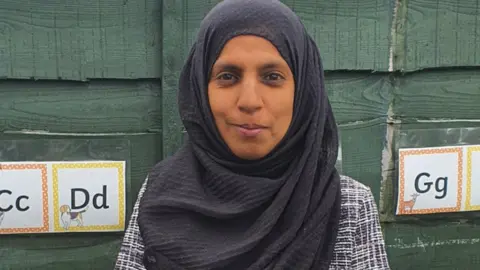Coronavirus: ‘The nursery I run may not survive’
 Zoe Rae
Zoe Rae"We might be able to last another two months, but without more help we won't last longer," says Zoe Rae, who owns Goldsmiths Community Nursery in south-east London.
She typically caters to 30 children, but since the lockdown began that has fallen to just three after providers were told they should only stay open for families of key workers.
Her income has slumped, so she has put 10 of her staff on paid leave, partly using the government's Coronavirus Job Retention Scheme (CJRS).
Ms Rae, 35, also continues to get some state funding for the free childcare she would normally deliver.
But she still has two full-time salaries to pay, as well as overheads like rent and waste collection fees, and is running at a loss.
'Morally right'
"I think the government should do more to help nurseries," she tells the BBC.
"They asked us to stay open for key workers, and we think it is the right thing to do morally. But the support they offer doesn't cover the costs."
According to a survey of more than 3,000 nurseries, pre-schools and childminders by the Early Years Alliance, one in four say they will have to close permanently within the next 12 months due to financial problems.
Some 74% also think the government has not given them enough support to get through the crisis, the lobby group found.
 Getty Images
Getty ImagesTo protect themselves, some nurseries have been asking parents to pay retainer fees to hold their child's place. But it sparked a backlash and the Competition and Markets Authority is now investigating.
Tulip Siddiq, Labour's shadow minister for early years, said the survey "is further evidence that the government's lack of support is forcing nurseries and other providers to close and sack staff".
"Losing a quarter of our childcare providers in this crisis would have a devastating impact on working families."

How many childcare providers are there?
There were 24,000 nurseries and pre-schools in England in 2019, according to schools regulator Ofsted. Together they provided 1,075,000 childcare places.
There were also 35,500 childminders delivering 231,000 early years places.

The Department for Education (DfE) says it is offering childcare providers - most of whom are private or voluntary - a range of support.
This includes access to the CJRS, which pays 80% of a worker's salary, and continued state funding for free childcare - although these pots of funding must offset each other.
Some will also be able to access emergency business rates relief and the government's £10,000 Small Business Grant.
However, the Early Years Alliance says too many are falling through the cracks of this support.
 Zarah Hussain
Zarah Hussain Zarah Hussain, 40, like many childminders is self employed. She is thinking of closing her business in Manchester after the number of families she caters to fell from eight to one.
The issue is that she cannot get any wage support from the government because her accounts don't go back far enough, and so she has no personal income.
"I still have to pay for my public liability insurance, Ofsted registration fees and subscriptions to learning resources websites," she says.
"I'm using my savings to keep going but I have my own family to support."
She also thinks the government should do more to help, saying businesses like hers are "crucial to key workers" and stay open 12 hours a day.
"If people like us fall away people are going to have to rely on unregistered childminders and that raises safeguarding issues."
Funding U-turn?
The Early Years Alliance points to other blind spots in the government's support. For example, providers are not entitled to a small business grant if they are based in premises that don't attract rates relief, such as community centres.
There has also been widespread anger about a perceived U-turn by the DfE over how much support providers can get through the government's job retention scheme.
The group claims that at the start of the lockdown, the DfE gave providers the impression they would get both their state-funded entitlements and CJRS support in full.
However, almost a month later the department offered "further clarity" to explain that these two schemes would offset each other to avoid unfair duplication of public funding.
The DfE denies it U-turned and says HM Revenue & Customs, which administers the CJRS, was always clear about the terms and conditions which apply "universally across all sectors".
Nevertheless, almost 170,000 people have signed a petition, arguing that it wrong-footed childcare providers who now have less cash support than they originally thought.
In the group's survey, 47% said they may need to make staff redundant as a result.
'Vital role'
Amanda Philips, who runs the Little School House nursery in Liverpool, feels the DfE "changed the goalposts".
She had temporarily shut her nursery and put 10 staff on paid leave back in March. But now she is not sure if she will ever open again.
"We thought with the government funding and the furlough we'd be fine and get through this, but now we're on the brink."
A DfE spokeswoman said: "Nurseries, childminders and all other early years settings are playing a vital role in the response to coronavirus, by supporting critical workers and parents of vulnerable children with continued childcare.
"We have provided continuity in funding for the free childcare entitlements, and the government has put in place a significant package of financial support for providers. This includes the Coronavirus Job Retention Scheme, which providers can access for employees whose salary is not covered by public funding."

- A SIMPLE GUIDE: How do I protect myself?
- AVOIDING CONTACT: The rules on self-isolation and exercise
- WILL I GET PAID IF I CAN'T WORK? Rules on sick pay, wages and time off
- PUBLIC TRANSPORT: Is it safe to travel?
- TESTING: Can I get tested for coronavirus?

